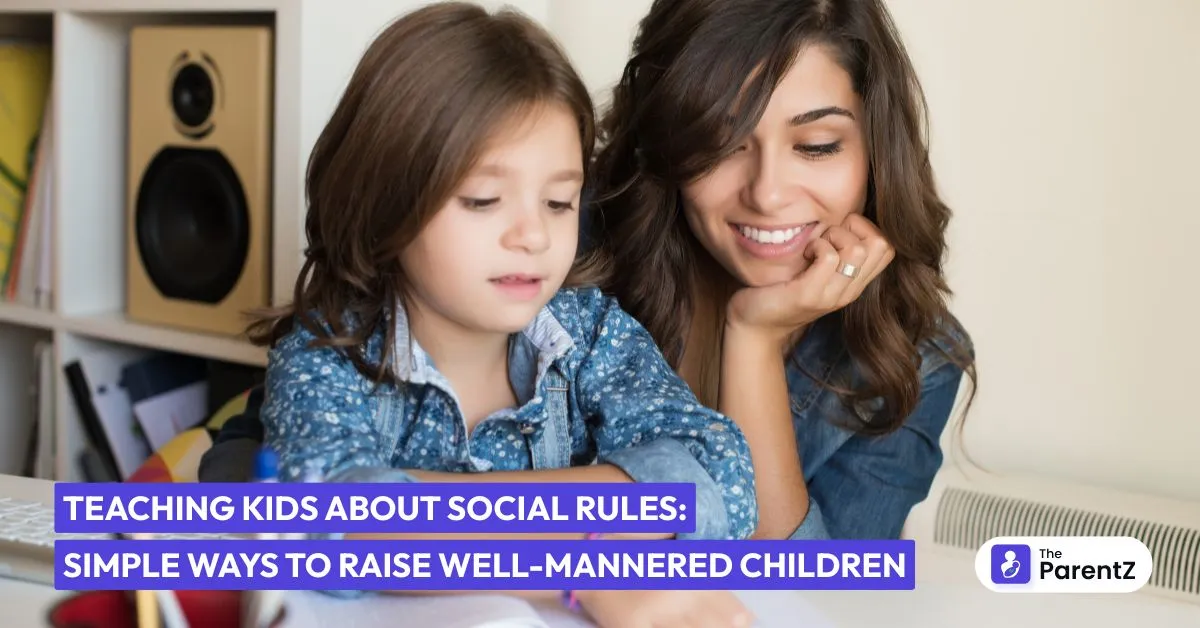We all know that moment. You're at the grocery store, and your child loudly points out someone's appearance. Or they interrupt an adult conversation for the fifth time. Or maybe they forget to say "thank you" when receiving a gift. As parents, these moments make us cringe, but they're also perfect teaching opportunities.
Social rules are those unwritten guidelines that help us all get along. While adults navigate these naturally, kids need our help to learn them. Let's talk about how we can teach our children these important skills without turning it into a chore.
Why Social Rules Matter
Social rules are the invisible threads that help us get along with others. They make social situations smoother and help everyone feel respected and comfortable. When kids know these rules, they’re more likely to make friends, avoid misunderstandings, and feel confident in different settings: at school, at home, or out in the world.
Start With the Basics
Young children can start learning simple social rules as early as age 2-3:
- The Magic Words: "Please," "Thank you," and "Sorry" are the foundation of politeness. Make these words part of your family's everyday vocabulary.
- Taking Turns: Whether it's waiting for their turn on the slide or speaking in a conversation, taking turns is a crucial skill. Board games are great practice for this!
- Greetings: Teach your child to say hello and goodbye. Even a shy wave is a good start for very young children.
- Personal Space: Help kids understand that everyone has an invisible "bubble" around them. Not everyone wants a hug or to be touched.
Moving Beyond Basics
As children grow, they can learn more complex social rules:
- Reading the Room: Help them notice when people are busy, tired, or having a private conversation.
- Table Manners: Chewing with the mouth closed, using utensils appropriately, and cleaning up after themselves.
- Digital Etiquette: In today's world, knowing when to put devices away and how to behave online is essential.
- Respecting Differences: Teaching kids that people have different needs, beliefs, and backgrounds is crucial for building empathy.
- Don't Interrupt: Teach children to wait for a pause in conversation before speaking, or to say "excuse me" if something is urgent.
- Knocking Before Entering: This teaches respect for privacy and boundaries, whether it's a bedroom, bathroom, or any closed door.
- Public Space Awareness: Not blocking walkways, speaking at appropriate volumes, and being mindful of shared spaces.
- Bathroom Etiquette: Flushing, washing hands, and leaving facilities clean for the next person.
Additional Important Social Rules
Here are more specific rules that help kids navigate their social world:
- Offering Help: Teaching kids to notice when someone might need assistance, like holding a door when someone's hands are full or helping pick up dropped items.
- Gift Receiving: Showing appreciation even if it's not something they wanted, focusing on the thought behind the gift.
- Not Commenting on Appearances: Teaching kids that remarks about someone's body, skin color, disabilities, or clothing choices can be hurtful, even if they're just being curious.
- Elevator Etiquette: Letting people exit before entering, not pushing all the buttons, and respecting personal space in small areas.
- Sharing Public Spaces: Taking turns on playground equipment, not hogging shared resources, and understanding that public spaces belong to everyone.
- Respecting Others' Belongings: Not touching items on someone else's desk, asking permission before borrowing, and returning items in good condition.
- Covering Coughs and Sneezes: Using their elbow or a tissue, then washing hands - a health rule that's also about respecting others.
- Not Double-Dipping: Food safety and courtesy when sharing snacks or meals with others.
Making Learning Fun
Nobody wants lessons that feel like lectures. Here are some enjoyable ways to teach social skills:
- Role Play: Act out scenarios like meeting someone new or apologizing after a mistake.
- Children's Books: Many wonderful books address social skills. Read them together and discuss.
- Natural Consequences: Sometimes, experiencing the natural outcome of forgetting social rules (like not being invited back to play) teaches more than our words ever could.
- Praise Good Behavior: When you catch your child remembering to say "excuse me" or sharing nicely, give specific praise: "I noticed how you waited until I finished my sentence before asking your question. That was really respectful!"
Leading By Example
Kids are watching us ALL THE TIME. They notice when we:
- Thank the cashier at the store
- Hold the door for others
- Put our phones away during conversations
- Apologize when we make mistakes
Your everyday behavior teaches more than any deliberate lesson ever could.
Handling Mistakes Gracefully
Every child will slip up. When they do:
- Stay calm (even if you're mortified!)
- Address it privately when possible.
- Explain why the behavior wasn't appropriate.
- Give them words or actions to make it right
- Move on without shame or extended lectures
Remember that learning social skills is a process with many mistakes along the way.
Adjusting for Different Children
Some children need more help with social rules than others:
- Children with autism or ADHD may need explicit teaching about facial expressions and social cues
- Highly sensitive children might need extra support with sensory-heavy social situations
- Extroverted children might need reminders about giving others space
- Shy children benefit from practice and preparation before social events
Conclusion
Teaching kids about social rules is one of the best gifts you can give them. It helps them build strong relationships, feel confident, and become thoughtful, well-mannered people. Start with the basics, keep it simple, and remember, everyday moments are the best classroom.
So next time your child says “please” or waits their turn, give yourself a pat on the back. You’re helping them become their best self, one social rule at a time.





Be the first one to comment on this story.